#this is a standard example in linguistics
Text
Studying linguistics is actually so wonderful because when you explain youth slang to older professors, instead of complaining about how "your generation can't speak right/ you're butchering the language" they light up and go “really? That’s so wonderful! What an innovative construction! Isn't language wonderful?"
#linguistics#gen z slang#english#as people in the reblog pointed out!#most gen z slang comes from (or was appropriated from) aave#honestly I was just excited to talk about how people in my field actually get excited about non standard uses of English#instead of ridiculing speakers#and I tagged incorrectly and didn’t point out the very real issues of language and power and appropriation inherent in modern slang#in that much of it was appropriated#and even that which experiences language change in the wider culture still originated in aave#aave is just as linguistically valid as any other English dialect because it is a proper language#and the grammar is incredible!!!#habitual be is fantastic and an excellent example of how a richer case system or a certain case can render an adverb unnecessary#and the phonology is just beautiful#anyway I’m very sorry#I fucked up
21K notes
·
View notes
Text
I feel like anyone who's about to embark on attempting to type out a character's accent phoentically (at least as well as one can with English) should probably stop for a moment before they get going and ask themselves, "How would I, myself, feel about a fic where the one character who sounds like me had their speech written out like this and every other character just got their dialogue left in standard spelling?" I feel like a lot of people would tone it down a bit, at least, if they'd done that thought experiment first.
(Anyone who answered "but I don't have an accent!" isn't allowed to write out anyone else's accent, ever. This rule may seem harsh but you need it. Really, you do. Because you've never had anyone treat your accent as abnormal or comical or wrong, so you really don't know what you're inflicting on others here.)
#writing stuff#have you read that fic where the socially prestige accent is the one being carefully typed out “like it sounds”? no? neither have i :(#the obvious note-for-Americans on typing out UK accents is that most of them carry some connotation of class and/or 'education'#within the uk: ask yourself why a Geordie gets typed out but not some dude from the Home Counties#typing out an accent is - usually - a roundabout way of saying “this person talks WRONG! they're not NORMAL!”#you may also find 'Scottish Twitter' informative for the distinction between in-group and out-group 'transcriptions' of accent/dialect#(i use that example only cos I'm Scottish btw)#(oh yes EVERYONE thinks I have an accent! and many of them attempt to replicate it badly in text!)#fun story: one time i had to learn the [IPA] for a linguistics class and the examples were 'standard' English pronunciations#and I went in the next day BAFFLED by why the book insisted that 'boot' and 'foot' don't contain the same vowel sound#(cos they fuckin do don't they?!)#the tutor explained and was v interested in the fact that to me they're the same. i was then asked to demonstrate again for the class.#but i - alas - was not offered repeated examples of however the fuck people say boot and foot in RP :(#(this was IN SCOTLAND btw)#anyway mibbe jist dinnae dae it? mibbe?#and if you do you have use the actual IPA. there now i've made it more trouble than it's worth for most people.
266 notes
·
View notes
Text
i think it’s so beautiful how there are certain language features that we reserve purely for poetry and the like; there’s strict syntactical rules when speaking english day-to-day but if you want to play with them? bend them? break them? in the name of art? sure, go ahead. you can go a long way without impairing communication of your message, and on top of that—it just sounds prettier.
#i thought of this when reading some poem last week or the week before#and then i thought of it again listening to the mechs’ underworld blues#when heracles says ‘i came here your dog to seize’#and then the very next day i had a spanish linguistics seminar on syntax where we were discussing when to use verb-object or object-verb#and in translating examples noticed when it’s acceptable to switch them in english too#though of course it works differently#but like ‘a castle stood upon the hill’ vs ‘upon the hill there stood a castle’#that one’s only a mild example of this really though#not just restricted to poetry but common in prose too#of course there’s a lot of crossover and these rules are more lenient when writing prose than when speaking in daily life#but i’m more thinking of the absolute refusal to follow grammatical rules in favour of creating rhythm and rhyme that you find often#in poetry#i just love language#and this is just the standard rule breaking of poetry not even when people make a point of breaking rules as part of their art#poetry#language#dark academia#linguistics#english language
93 notes
·
View notes
Text
new question i should look into: why are more rural/country accents associated with "a twang" seemingly cross-linguistically? is this an actual phenomenon or is it just a coincidence? related, what actually is behind the twang? i imagine it's just nasalisation, but what's the motivation for its development (or maybe why is it absent in dialects that are considered more standard)?
#if i listed examples i think i'd start fights over what i am classifying as standard vs country#i don't like using standard or country to refer to any accent/dialect but i needed easy to understand terms okay#and i'm speaking in generalisations anyways#but like i've noticed a trend with at least 3 debatably 4 'languages' and corresponding rural dialects and it just got me thinking#linguistics#languages#dialect#accents
1 note
·
View note
Note
https://www.tumblr.com/mishkakagehishka/715671353912639488?source=share
abt this smth funny is that i can't read or estimate tempreture in fahrinhite (i cant even spell it right) becausr everyone else uses celcius. im scared of saying this sometines bc i've seen americans get mad at ppl for using celcius online
- chicken liver
I mean right? I even tried my best to use their definition of "percentage of hotness" but it just doesn't work because how much you can take is also very subjective. I'd say 70F would be like 25°C, because that's what I'd call "70% hot" (which is also so abstract to me i had to actually think hard about it) and 100F, I'd maybe attribute to 41°C. But 70 is actually 21°C, and 100 is 37,8°C
I can even excuse using feet and inches and pounds in english, because those are the units used in most anglosphone countries, but fahrenheit
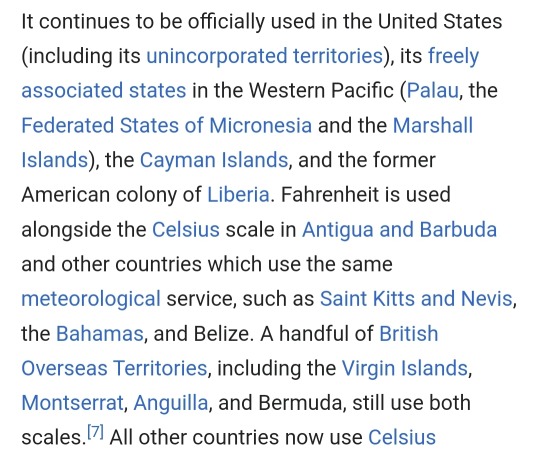
These are the areas that use fahrenheit according to wikipedia.
I mean, in the end, saying "x is just more intuitive" is not the best argument. What's more intuitive is what you spend your whole life using. I don't get celsius either, i just know 23 is nice, 26 is hell if it's humid, and if it's above 32, don't even think of seeing me out of the shade.
#i also mentioned the ideology of logic for a reason#even tho it's a linguistic ideology#it says the same thing - saying for example that double negations are illogical is not correct because there are languages that have#double negation as part of the standard form or saying that a certain word order is logical is incorrect because there are languages that#use other word orders in their standard languages (we used Italian and Welsh compared to English as examples)#it's the same for this to me. you can't say one measure is more logical (intuitive) when others find it incomprehensible and prefer the#other just because it's more logical to you#just say ''i'm used to it so i don't wanna switch'' and go yknow?#asks
1 note
·
View note
Note
While we’re on the subject of names, is there an explanation for how traditional nicknames came about that are seemingly unrelated to, or have little in common with, the original name?
ie- John/Jack, Richard/Dick, Henry/Harry/Hank, Charles/Chuck, Margaret/Peggy/Daisy, Sarah/Sally, Mary/Molly, Anne/Nan, etc
I am actually over a week into researching a huge follow-up post (probably more than one if I’m being honest) about the history of nickname usage, so I will be going into this in much, much more detail at a hopefully not-so-later date - if I have not lost my mind. (Two days ago I spent three hours chasing down a source lead that turned out to be a typographical error from 1727 that was then quoted in source after source for the next 150 years.)
As a preview though, here’s some info about the names you mentioned:
The origins of a good portion of common English nicknames come down to the simple fact that people really, really like rhyming things. Will 🠞Bill, Rob🠞Bob, Rick🠞Dick, Meg🠞Peg.
It may seem like a weird reason, but how many of you have known an Anna/Hannah-Banana? I exclusively refer to my Mom’s cat as Toes even though her name is Moe (Moesie-Toesies 🠞 Toesies 🠞 Toes).
Jack likely evolved from the use of the Middle English diminutive suffix “-chen” - pronounced (and often spelled) “-kyn” or “kin”. The use of -chen as a diminutive suffix still endures in modern German - as in “liebchen” = sweetheart (lieb “love” + -chen).
John (Jan) 🠞 Jankin 🠞 Jackin 🠞 Jack.
Hank was also originally a nickname for John from the same source. I and J were not distinct letters in English until the 17th Century. “Iankin” would have been nearly indistinguishable in pronunciation from “Hankin” due to H-dropping. It’s believed to have switched over to being a nickname for Henry in early Colonial America due to the English being exposed to the Dutch nickname for Henrik - “Henk”.
Harry is thought to be a remnant of how Henry was pronounced up until the early modern era. The name was introduced to England during the Norman conquest as the French Henri (On-REE). The already muted nasal n was dropped in the English pronunciation. With a lack of standardized spelling, the two names were used interchangeably in records throughout the middle ages. So all the early English King Henrys would have written their name Henry and pronounced it Harry.
Sally and Molly likely developed simply because little kids can’t say R’s or L’s. Mary 🠞 Mawy 🠞 Molly. Sary 🠞 Sawy 🠞 Sally.
Daisy became a nickname for Margaret because in French garden daisies are called marguerites.
Nan for Anne is an example of a very cool linguistic process called rebracketing, where two words that are often said/written together transfer letters/morphemes over time. The English use of “an” instead of “a” before words beginning with vowels is a common cause of rebracketing. For example: the Middle English “an eute” became “a newt”, and “a napron” became “an apron”. In the case of nicknames the use of the archaic possessive “mine” is often the culprit. “Mine Anne” over time became “My Nan” as “mine” fell out of use. Ned and Nell have the same origin.
Oddly enough the word “nickname” is itself a result of rebracketing, from the Middle English “an eke (meaning additional) name”.
I realized earlier this week that my cat (Toe’s sister) also has a rebracketing nickname. Her name is Mina, but I call her Nom Nom - formed by me being very annoying and saying her name a bunch of time in a row - miNAMiNAMiNAM.
Chuck is a very modern (20th century) nickname which I’ll have to get back to you on as I started my research in the 16th century and am only up to the 1810s so far lol.
#names#nicknames#onomastics#history#asks#nicknames are really hard to research you guys#there is so much info out there and it's almost all nonsense#and I'm talking academic books with listed sources not buzzfeed listicles#some guy in the 18th century forgetting to mention Bill on a list of common nicknames does not mean it wasn't in use at the time ma dude#i've had to get very creative with sources#god bless word for word murder trial testimony
2K notes
·
View notes
Text
Japanese Linguistic Observations in Spy x Family - part 2
Part 2 - Anya's "Anya-isms"
I think Anya has one of the most interesting ways of speaking out of all the SxF characters. But like with Twilight's dialogue that I previously discussed, it can only be fully appreciated in the Japanese version. Probably the most noticeable thing about her dialogue is how it's written compared to the other characters.

Written Japanese is comprised of three different alphabets: ひらがな (hiragana) and カタカナ (katakana), which together are referred to as "kana," and 漢字 (kanji). Kanji are the characters that hold the meaning of words, while kana simply represent the various Japanese syllable sounds and don't have any meaning on their own (much like the letters of the English alphabet). There are only about 100-ish total unique kana symbols, however, there are over 2,000 kanji in common use today. So Japanese children will start out learning kana and then learn kanji gradually during their school years. This is why Japanese children's books are typically written only or mostly in kana. This is also why manga and books aimed at a younger audience will have kana "translations" of kanji written above kanji characters, which are called furigana.
With that in mind, it's not surprising that all of Anya's dialogue in the Japanese version of the SxF manga is written entirely in kana. Even though using kanji in her dialogue wouldn't necessarily mean she knows kanji, reading a character's dialogue only in kana definitely gives off childish vibes – it conveys feelings of youthfulness and innocence, like "they're speaking only in kana because they don't know the kanji for these words…they're just a little kid, after all." At least, that's the feeling I get when I read Anya's dialogue. Though I haven't read enough manga in Japanese to say for sure, it seems like this concept of making little kids speak only in kana is not unusual, as there's at least one other example I know of: a manga from the mid-2000s called Yotsuba also has a titular 5-year old whose dialogue is written only in kana.

What's also interesting is that all of the other Eden kids speak "normally," using kana and kanji properly in their dialogue. This helps to convey the fact that, despite Anya being roughly the same age as them, their "rich family" upbringing has forced them to grow up faster. In the below panel, you can see how Damian's dialogue uses kanji (with furigana translations) while Anya's uses only kana, even for words that have kanji.
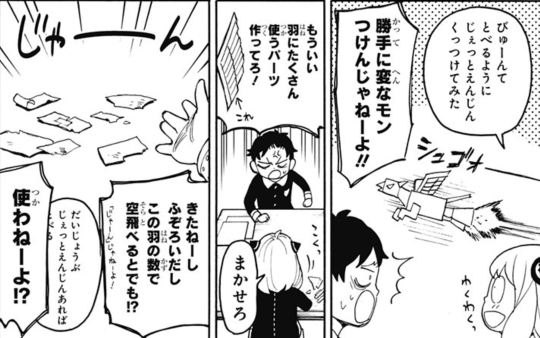
Interestingly, I found at least two cases where Anya does use kanji in her dialogue: when she's calling out the name of her big "Arrow of Light, Seize the Star" move during the dodgeball game, and when she calls out her "Lighting Bolt, Deliver my Aid" move when she tries to throw Yor's weapon back on the deck in the cruise arc. As you can see in the below panels, the names of these "moves" is written in kanji (with furigana translations). This makes sense not only because this is parodying shonen series where the characters shout out the names of their moves, but because it emphasizes how determined Anya was at these moments.
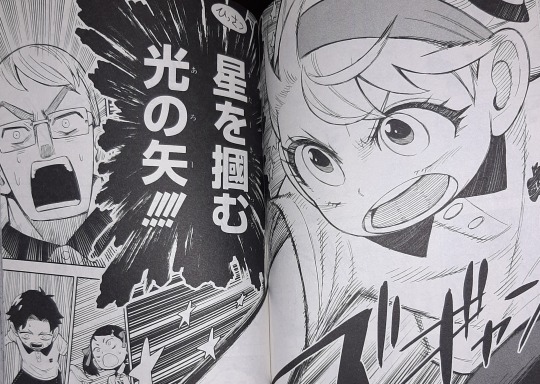
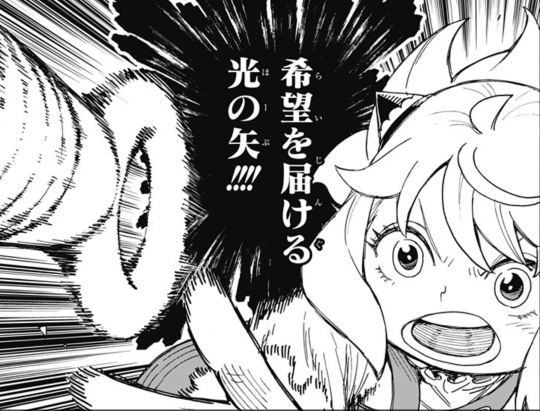
But going back to how Anya's speech compares to the other kids, another thing that stands out is that she speaks very "plainly." Her grammar is (mostly) correct, except for a few mistakes you'd expect a little kid to make. But she uses pretty much no colloquialisms, almost as if she knows the language but lacks the experience for using it in normal social interactions. I don't think this is unusual for a kid her age who's still learning, but it definitely stands out when compared to her classmates. For example, in the below panel, Becky uses normal interjections and other colloquialisms in her speech, like "ne" (ね), "wa" (わ), and "yo" (よ), which are all standard Japanese linguistic devices for softening or emphasizing your sentences. However, Anya doesn't use things like this in her speech. Again, this makes her speech come off as very plain and abrupt, almost like she's not a native speaker.
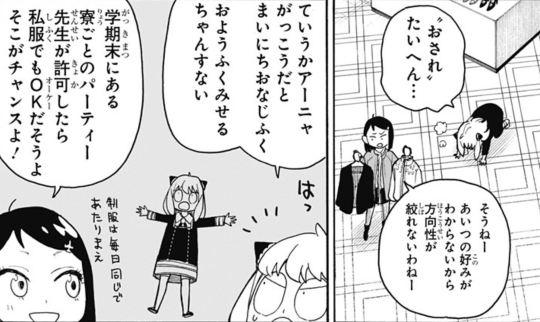
She also refers to herself in third person all the time in the Japanese version. In fact, I don't recall her ever using an "I" or "me" pronoun. I don't know why the English version of the manga doesn't keep this characteristic of her speech. I think it's very important in highlighting the childish aspect of her personality.
Putting all this together – the fact that she doesn't use typical colloquial speech and refers to herself in third person – really emphasizes the childish, naive, and almost baby-like nature of her character. I'm curious if Endo made her speak this way simply to show what a little kid she is compared to her classmates, or if it will somehow tie back to whatever roots she has in classical languages that he keeps hinting at. Regardless, as I mentioned in my full Anya analysis, what she lacks in speech and school smarts, she makes up for in empathy and resourcefulness.
Besides all this, Anya does make typical speech mistakes a normal kid would make, like mishearing words or saying things wrong. She mostly uses casual speech, but does try to use keigo (polite speech) on occasion, though not always correctly. For example, she says "ohayaimasu" (おはやいます) for "good morning" instead of "ohaiyou gozaimasu" (おはようございます).
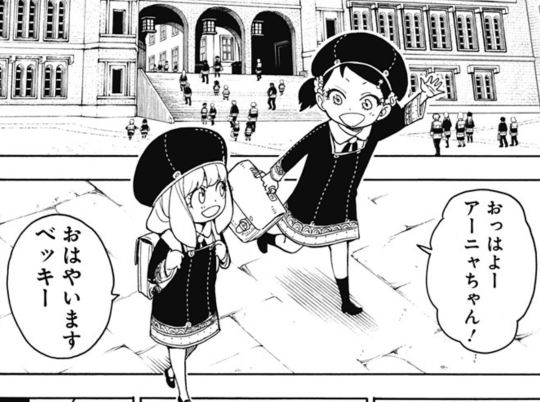
But the most consistent "mistake" she makes (though it's not really a mistake) is what she calls Loid and Yor – "chichi" (ちち) and "haha" (はは) respectively.
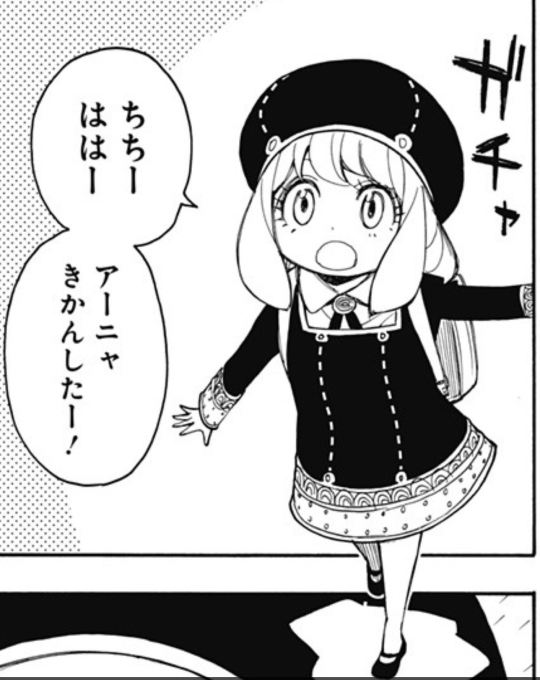
Japanese has many different words for relatives depending on whether you're talking about your own relatives or someone else's, and whether you're talking to them or about them. "Chichi" and "haha" are the general, neutral terms for "father" and "mother," and are also used when talking about your parents to someone else. However, they're not used when talking directly to your mother and father. There are many other words for that, the usual ones being "o-tou-san" (お父さん) and "o-kaa-san" (お母さん), or some variations of these with different honorifics. Damian refers to his dad as "chichi-ue" (父上) which is very formal, while Becky calls her dad the actual English word "papa" (パパ) which is very informal and normal for kids to use. But again, "chichi" and "haha" are typically only used when talking about your parents, not to them the way Anya uses them. This started from the very first chapter where Loid asks her to call him something that sounds "elite." He originally suggests the very formal "o-tou-sama" (お父さま), but when Anya says "chichi," he doesn't bother to correct her.

Hearing a little kid call her dad and mom "chichi" and "haha" is kind of like calling them "my father" and "my mother" even when speaking to them directly – it's not wrong necessarily, just strange. But again, this serves to further emphasize the childlike nature of Anya's character.
<- Return to Part 1
Continue to Part 3 ->
538 notes
·
View notes
Note
you were probably asked this before, but by saying "certified Palestinian Jew" do you mean your ancestors lived in Israel before immigration became popular, or do you mean a Jewish Palestinian? (I'm assuming the former tho)
Neither, actually. I put it there to point out the absurdity of the idea of a Jewish Palestinian in a modern sense, as well as the absurdity of the modern distinction between “Palestinians” and citizens of neighboring Arab countries. (As you correctly assumed.)
My father’s family immigrated to the US from Ottoman and British controlled “Palestine” (Haifa, specifically, which is now in Israel). They were Arabic-speaking Christians who had lived in that region as far back as they could trace their family history.
Since UNWRA tracks Palestinian refugee status patrilineally, by that standard, behold: me, a Palestinian Jew!
The irony is that they never once identified as Palestinian- they were Syrian through and through, as were all their neighbors and friends.
This is an anecdotal example of the declaration made in the 1919 Palestine Arab Congress which I’ll link the wiki page to below.
One major claim of the Congress was
"We consider Palestine nothing but part of Arab Syria and it has never been separated from it at any stage. We are tied to it by national, religious, linguistic, moral, economic, and geographic bounds."
In short- my Syrian (actually Assyrian Syrian- but that’s a whole other can of worms) family has been retroactively labeled Palestinian by political actors seeking to isolate the Arabs in Palestine and thereby promote conflict. Hope that answers your question 😊 Please feel free to discuss or ask me further questions.
163 notes
·
View notes
Note
genq what are the actual reasons that plagiarism is bad apart from profit and prestige?
so there are two main angles i usually think of here, which ultimately converge into some related issues in public discourse and knowledge production.
firstly, plagiarism should not just be understood as a violation one individual perpetuates against another; it has a larger role in processes of epistemological violence and suppression of certain people's arguments, ideas, and labour. consider the following three examples of plagiarism that is not at all counter to current structures of knowledge production, but rather undergirds them:
in colonial expeditions and encounters from roughly the 14th century onward, a repeated and common practice among european explorer-naturalists was to rely on indigenous people's knowledge of botany, geography, natural history, and so forth, but to then go on to publish this knowledge in their own native tongues (meaning most of the indigenous people they had learned from could not access, read, or respond to such publications), with little, vague, or no attribution to their correspondents, guides, hosts, &c. (many many examples; allison bigelow's 'mining language' discusses this in 16th and 17th century american mining, with a linguistic analysis foregrounded)
throughout the renaissance and early modern period, in contexts where european women were generally not welcome to seek university education, it was nonetheless common practice for men of science to rely on their wives, sisters, and other family members not just to keep house, but also to contribute to their scientific work as research assistants, translators, fund-raisers, &c. attribution practices varied but it is very commonly the case that when (if ever) historians revisit the biographies of famous men of science, they discover women around these men who were actively contributing to their intellectual work, to an extent previously unknown or downplayed (off the top of my head, marie-anne lavoisier; emma darwin; caroline herschel; rosalie lamarck; mileva marić-einstein...)
it is standard practice today for university professors to run labs where their research assistants are grad students and postdocs; to rely on grad students, undergrads, and postdocs to contribute to book projects and papers; and so forth. again, attribution varies, but generally speaking the credit for academic work goes to the faculty member at the head of the project, maybe with a few research assistants credited secondarily, and the rest of the lab / department / project uncredited or vaguely thanked in the acknowledgments.
in all of these cases, you can see how plagiarism is perpetuated by pre-existing inequities and structures of exploitation, and in turn helps perpetuate those structures by continuing to discursively erase the existence of people made socially marginal in the process of knowledge production. so, what's at stake here is more than just the specific individuals whose work has been presented as someone else's discovery (though of course this is unjust already!); it's also the structural factors that make academic and intellectual discourse an élite, exclusive activity that most people are barred from participating in. a critique of plagiarism therefore needs to move beyond the idea that a number of wronged individuals ought to be credited for their ideas (though again, they should be) and instead turn to the structures that create positions of epistemological authority under the aegis of capitalist entities: universities, legacy as well as new media outlets, and so forth. the issue here is the positions of prestige themselves, regardless of who holds them; they are, definitionally, not instruments of justice or open discourse.
secondly, there's the effect plagiarism has on public discourse and the dissemination of knowledge. this is an issue because plagiarism by definition obscures the circulation and origin of ideas, as well as a full understanding of the labour process that produces knowledge. you can see in the above examples how the attribution of other people's ideas as your own works to turn you into a mythologised sort of lone genius figure, whose role is now to spread your brilliance unidirectionally to the masses. as a result, the vast majority of people are now doubly shut out of any public discourse or debate, except as passive recipients of articles, posts, &c. you can't trace claims easily, you don't see the vast number of people who actually contribute to any given idea, and this all works to protect the class and professional interests of the select few who do manage to attain élite intellectual status, by reinforcing and widening the created gap between expert and layperson (a distinction that, again, tracks heavily along lines of race, gender, and so forth).
so you can see how these two issues really are part of one and the same structural problem, which is knowledge production as a tool of power, and one that both follows from and reinforces existing class hierarchies. in truth, knowledge is usually a collaborative affair (who among us has ever had a truly original idea...) and attributions should be a way of both acknowledging our debts to other people, and creating transparency in our efforts to stake claims and develop ideas. but, as long as there are benefits, both economic and social, to be gained from presenting yourself as an originator of knowledge, people will continue to be incentivised to do this. plagiarism is not an exception or an aberration; it's at best a very predictable outcome of the operating logics of this 'knowledge economy', and at worst—as in the examples above—a normal part of how expert knowledge is produced, and its value protected, in a system that is by design inequitable and exclusive.
389 notes
·
View notes
Text
i think one of the bigger tells we have in the kirby fandom for whether someone is genuinely trying to share information or is just trying to start slapfights about headcanon is the phrase “kirby is canonically nonbinary in japan”. i’ve almost never seen that phrase used as anything other than code for “your headcanon is wrong” - when it is said earnestly, it’s almost always because the person saying it was just repeating it from elsewhere.
*for those just tuning in: kirby isn’t canonically anything in japan. his gender is strictly unknown and this is a very intentional choice on HAL’s part. japanese is what is known as a “pro-drop language”, which means that pronouns of all classes can be omitted from standard linguistical use. this is particularly true of second- and third-person pronouns; saying “he” or “she” often sounds unnatural in speech. you could give a whole description of someone in japanese without ever inferring their gender, and this is exactly what HAL does with kirby. it’s a completely normal and mundane function of the language - kirby isn’t even the only character who is referred to this way! several major and minor characters never have their gender referred to in any way, including meta knight for example.
the only slightly gendered thing about kirby is his first-person pronoun: he uses “boku” in japanese on the rare occasions that he speaks. boku is a typically masculine pronoun, but it gives off an informal, young boy kind of feel, and is commonly used by all genders in media.
kirby, like a lot of nintendo’s early protagonists, is meant to be something of a blank slate for the player to project what they want on. in external media like comic books, twitter posts, etc., kirby is often shown participating in both girls-only and boys-only events. makiko ohmoto has said that she sees people imagining kirby as a boy or as a girl and that she’s fond of any interpretation.
(for a bit of an added fun fact, this is a large part of why female kirby interpretations are so popular in the japanese fandom - gijinka or otherwise!)
#kirby#lots more to be said about this but it mostly boils down to me rambling about linguistics so i'll spare you all gkhdffgdhjlk#tl;dr: ''unknown'' =/= nonbinary
431 notes
·
View notes
Text
"British comedian Michael McIntyre has a standard bit in his standup routines concerning the many (many!) slang terms posh British people use to describe being drunk. These include "wellied," "trousered," and "ratarsed," to name a few. McIntyre's bit rests on his assertion that pretty much any English word can be modified into a so-called "drunkonym," bolstered by a few handy examples: "I was utterly gazeboed," or "I am going to get totally and utterly carparked."
It's a clever riff that sparked the interest of two German linguists. Christina Sanchez-Stockhammer of Chemnitz University of Technology and Peter Uhrig of FAU Erlangen-Nuremberg decided to draw on their expertise to test McIntyre's claim that any word in the English language could be modified to mean "being in a state of high inebriation." Given their prevalence, "It is highly surprising that drunkonyms are still under-researched from a linguistic perspective," the authors wrote in their new paper published in the Yearbook of the German Cognitive Linguistics Association. Bonus: the authors included an extensive appendix of 546 English synonyms for "drunk," drawn from various sources, which makes for entertaining reading.
There is a long tradition of coming up with colorful expressions for drunkenness in the English language, with the Oxford English Dictionary listing a usage as early as 1382: "merry," meaning "boisterous or cheerful due to alcohol; slight drunk, tipsy." Another OED entry from 1630 lists "blinde" (as in blind drunk) as a drunkonym. Even Benjamin Franklin got into the act with his 1737 Drinker's Dictionary, listing 288 words and phrases for denoting drunkenness. By 1975, there were more than 353 synonyms for "drunk" listed in that year's edition of the Dictionary of American Slang. By 1981, linguist Harry Levine noted 900 terms used as drunkonyms.
So the sheer number of drunkonyms has been increasing, with BBC culture reporter Susie Dent estimating in 2017 that there are some 3,000 English slang synonyms for being drunk, including "ramsquaddled," "obfusticated," "tight as a tick," and my personal favorite, "been too free with Sir Richard." " [keep reading]
98 notes
·
View notes
Text
New Research Article: Creating Inclusive Linguistics Communication: Crash Course Linguistics
This handbook chapter is a behind-the-scenes of how the Crash Course Linguistics video series came together. I’m really proud that this article includes contributions from the linguistics writing team, including my co-writer Gretchen McCulloch, and our fact checker Jessi Grieser, but also from members of the Complexly team, who produced the show, including Nicole Sweeney, Rachel Alatalo, Hannah Bodenhausen and Ceri Riley. As with the actual videos themselves, this was a dream team. Lingcomm that is inclusive doesn’t just happen as an accident - in this article we discuss some of the ways we set things up to make the best series we could.
This chapter is also a dream project, because it’s part of the excellent double feature: Inclusion in Linguistics and Decolonizing Linguistics, both edited by Anne Charity Hudley, Christine Mallinson, & Mary Bucholz for Oxford University Press. These books are both be available through digital open access. They include some of your new favouite classics about the state of linguistics in research, education and outreach, even if you don’t know that just yet.
Abstract
This case study vignette provides an insight into the choices made in the writing of Crash Course Linguistics (Complexly/PBS 2020). This series of sixteen 10-minute videos cover core introductory level topics for English speakers who consume online content. We discuss how the topics were selected and arranged into a series order. We also discuss the ways we actively built inclusion into the series workflow and content, including in the team that worked on the content, the language examples selected and topics covered. Throughout we discuss the challenges and benefits of working in a collaborative team that includes a media production company and linguists with a commitment to public engagement and communication linguistics to new audiences. Sharing these observations about putting Crash Course Linguistics together is part of our commitment to using public communication to advance the standard of public engagement with the field, and the field’s approach to inclusive practice.
Reference
Gawne, Lauren, Gretchen McCulloch, Nicole Sweeney, Rachel Alatalo, Hannah Bodenhausen, Ceri Riley & Jessi Grieser. 2024. Creating Inclusive Linguistics Communication: Crash Course Linguistics. In Anne H. Charity Hudley, Christine Mallinson, and Mary Bucholtz (Eds), Inclusion in Linguistics, 383-396. Oxford University Press. [Open Access]
See Also:
Open Access for the whole Inclusion in Linguistics volume
Crash Course Linguistics on YouTube
Mutual Intelligibility posts for Crash Course Linguistics
#linguistics#language#crash course#crash course linguistics#lingcomm#inclusion in linguistics#publications
123 notes
·
View notes
Text
the atla universe if languages existed
hey there! ever wondered what avatar would be like if the nations actually spoke different languages? me too! here's my idea of how it would go:
(set during avatar: the last airbender, might add more during korra times another day)
quick disclaimer: i am an american who speaks american english and conversational france french. all of my language knowledge comes from youtube or school. this is just a silly little headcanon i needed to write down.
WATER
Within the water tribe’s language system, there are two main languages: Northern Water and Southern Water. Northern Water is spoken by the Northern Water tribe and Southern Water is spoken by the Southern Water tribe. Despite having similar names, the two languages are very different. When the Water tribes lived as one on the water lionturtle, they all spoke the same language (which we will call Olde Water), but after separation, they evolved independently. Think of the relationships between the two water languages as the relationship between French and Spanish. Their words can be similar (sol/soleil, luna/lune) because they share roots from Latin (or in this case, Olde Water). Northern Water and Southern Water share roots to the point where a Southern speaker and a Northern speaker would not be able to understand each other but could probably pick out a few key words from their speech. Similar words are things that are native to their area, while less common things that did not exist/were unknown during Olde Water times have differing words (the word for “polarbear-dog” is probably similar in both languages, but the word for “badgermole” is probably different). If the tribes met often for peace/community reasons (perhaps annually), then both languages would contain loanwords from the other tribe. For example, if sea prunes are a Southern Water tribe staple, then the word for “sea prunes” in the North is probably the same as it is in the South. Neither language has any sort of written component- it is completely oral.
Another, more niche language also exists within the Water language family, and that is Foggy Swamp. This language also originates from Olde Water, but has a great amount of Earth influence, since the swamp itself is in the Earth Kingdom (influence specifically from Omashu). Someone who speaks Olde Water would understand Foggy Swamp to the extent that someone who speaks American English would understand Pidgin English (that is, they would have to focus intently and would be able to get the jist of their speech). A Northern Water or Southern Water speaker would not be able to understand them at all, since their languages have developed so drastically from Olde Water. However, one could trace roots of words in Foggy Swamp back to Northern or Southern Water. An Earth speaker would not understand them at all either, but would be able to trace back loanwords and modern terminology (the word for “swamp” or “cat-gator”, for example, would be a lot more similar to Earth than it would be to Northern Water or Southern Water). Foggy Swamp also does not have a writing system.
EARTH
Because it covers such a vast space, the people of the Earth kingdom used to be incredibly linguistically diverse, with almost every city speaking differently than the next. During Kyoshi’s reign, Chin the Conqueror took over most of the kingdom and standardized the writing system (similar to the Qin dynasty in China), and therefore heavily influenced spoken language in the Earth kingdom. As an after-effect, Common Earth, also known as simply Earth, is the most widely spoken language in the world, to a similar extent as English or Mandarin Chinese. It is taught as a second language in every nation and it is hard to find a city where there are no Earth speakers. Everyone in the Earth kingdom speaks or understands Earth. Omashu Earth is an accent that is spoken primarily in the city of Omashu, and has tonal differences from Earth, similar to the difference between New York English and standard American English. Aside from Omashu Earth, the other areas of the Earth kingdom that were taken over by Chin do not have distinct accents. There are some slight variances, especially in the Southern islands between the Air temples, but all speakers of Common Earth can understand each other perfectly. Common Earth has a stable writing system that does not vary.
Despite Chin’s attempt to standardize language within the Earth kingdom, the places he did not conquer held fast to their respective languages. Ba Sing Se Earth, which can also be called Upper Ba Sing Se Earth, is the language that differs the most from Common Earth due to Ba Sing Se’s impenetrable walls cutting them off from the rest of the kingdom. Since both languages are derived from Olde Earth, they share similar writing systems, but neither language can understand each other (similar to the relationship between Cantonese and Mandarin). The walls between the Upper and Lower ring also created Lower Ba Sing Se Earth, where grammar is more simplified, due to the hasty lifestyle of a lower-class worker. Both Upper and Lower Ba Sing Se Earth speakers can understand each other, but Upper Ba Sing Se speakers might not be able to understand Lower slang. Their writing system is exactly the same. Kyoshi Earth is spoken solely on Kyoshi island, and is very similar to the former language of the people of Yokoya. It is not understandable to any other Earth speakers and functions similarly to the relationship between Japanese and Mandarin Chinese, with a different yet similar alphabet to Common Earth. The Si Wong tribes, who inhabit the Si Wong desert, speak various independent languages, but are collectively known as Si Wong Earth. Their languages have many loanwords from Common Earth due to trade. Their written language is syllabic and simple, similar to Cuneiform.
FIRE
Most of the Fire nation speaks the same language, but there are three main dialects within the Fire Nation language system. The most commonly spoken dialect is aptly named Fire, but is also known as Common Fire. This language is spoken within the Fire nation capital, Caldera, but is mainly used within the greater land mass of the Fire nation. It evolved from Olde Fire and is the most basic form of Fire nation speech. The most similar dialect is more of an accent with some different slang terms and is known as High Fire. It is spoken by the citizens of Caldera, especially the nobles. It is completely understandable to those who know Common Fire and vice versa. The relationship between the two languages is similar to the relationship between Canadian French and Quebecois. The main difference between High Fire and Common fire is pronunciation of words and tonal patterns within sentences and phrases. The last dialects all get looped into one group and are collectively known as Provincial Fire. Provincial Fire is spoken on the outskirts of the mainland and into the chain of islands off of the Fire nation. It varies greatly depending on what island or area of the mainland it is spoken in and has differences from Common Fire that are similar to Korean’s differences from its provincial dialects (speech pattern and tones, different slang terms). The further out one gets from Caldera, the stronger the dialect. Written language within the Fire nation is the same across all of the dialects and characters are similar to Mandarin Chinese as they are pictorial and syllabic (from canon).
The Sun Warriors are the only ethnic group of the Fire nation that speaks anything other than Common Fire. The Sun Warriors speak Sun Fire, which originates from Olde Fire as well, but has changed greatly since it was spoken within such a small group of people. Someone who speaks Common Fire would not understand Sun Fire at all, but could probably pick out a few words that have similar roots to Common Fire. Sun Fire has two written languages- one is reserved for spiritual leaders and spiritual texts, while the other is used by all people. Visually, it is similar to the differences between Japanese’s Kanji and Kana writing systems, where one is more simplified and one is more traditional. Spiritual written Sun Fire is more similar to written Common Fire.
AIR
The people of the Air nation only have one language: Air. Due to a high need of proper communication, as well as people constantly moving from temple to temple, or growing up at one and working at the other, Air nomads developed only a single language from Olde Air. Air nomads have a robust writing system to allow writing of incredibly complex ideas and air nomad journeys. Most nomads learn multiple other languages as they age, so they can succeed no matter where they find themselves in the world. Due to the destruction of the Air temples, Air is almost a completely lost language. Remaining speakers include Aang and his children, as well as a few Earth kingdom elders who learned the language from friends and passed it down to their children.
MISC.
Cities born out of the 100-year war, like Cranefish Town (Republic City), are another story. The Fire nation mandated that all colonies only speak Common Fire in hopes of destroying the culture of the city, but despite that, a hybrid language developed: Earthen Fire. To a non-speaker, Earthen Fire sounds like Common Fire, but the grammar structure is very Earth based (a Fire speaker can understand Earthen Fire in the way that a Dutch speaker can understand Afrikaans). It also incorporates many loanwords from Earth. The writing system involves the exact same characters as written Earth, so it almost sounds like Fire spoken with an Earth accent.
#atla#avatar#i hope someone actually reads this rant#avatar the last airbender#aang#sokka#katara#zuko#toph#suki#fire nation#water tribe#air nomads#earth kingdom#air temple#the legend of korra#tlok#korra#languages#etymology#polyglot#langblr#linguistics#worldbuilding#headcanon#atla headcanons#avatar headcanons#mega.exe#avatar languages#atla languages
326 notes
·
View notes
Text
The Seventh Day of Julius Caesar
Julius Caesar did not speak in Ecclesiastical Latin (also known as Italianate Latin).
This is a misconception close to my heart because I actually got banned from TikTok because of it!
Basically, I was scrolling through the comment section of a TikTok video when I saw someone wrote a comment saying that Classical Latin pronunciation is artificial and fake and that Ecclesiastical Latin is actually the real, natural pronunciation of Latin that every single ancient Roman spoke in.
I replied to them, saying no, Ecclesiastical Latin is the artificial one, because it is pronouncing Latin with modern Standard Italian phonology. Languages evolve and there is no reason why every single Latin-speaking ancient Roman should have pronounced it as if it was Standard Italian. Latin was a living language for a long time and was spoken in a very large area, of course there would be tons of accents and dialects, changing and evolving over hundreds of years, and none of them should be identical to Ecclesiastical Latin, which is based on a modern language.
When linguists use clues to get a good idea of how educated people in Rome spoke Latin around the time of Julius Caesar, it's called Classical Latin pronunciation. It's not artificial; it's our best guess. And we have a lot of clues!
By the way, it's so annoying to write anything intelligent on TikTok because the character limit on comments is so restrictive!
What happened next was an insane back and forth argument that took place over 5 hours, and I now realise that I should've never interacted with them in the first place because nothing good would've come out from that.
It was a very amusing but very frustrating argument. My favourite part was when they kept saying I should read Vox Latina by Sydney Allen, which by the way, I had already read. They must've bought their copy of the book from the Dollar Store because I do not know how they read the book and believed that the ancient Romans spoke Ecclesiastical Latin. The entire book is pretty much about how the ancient Romans did not speak Ecclesiastical Latin! The Classical Latin pronunciation that person hates so much is exactly what Sydney Allen wrote in support of in Vox Latina!
Though I wish less people treated Vox Latina like the gospel. It's great but pretty old and outdated. I especially disagree with what he said about the vowels.
Anyway, one very long very amusing very frustrating argument later, they reported me for being underage, which I'm not. Proving I wasn't underage was too obnoxious for me, so I just quit using TikTok. The End.
I'm so sorry for anyone who isn't interested in the pronunciation of Latin; this must be so boring for you. But what I'm trying to get at is that we have a pretty good idea of how Julius Caesar would've pronounced Latin, and it's not Ecclesiastical Latin.
For example, veni vidi vici in Ecclesiastical Latin is pronounced similar to veh-nee vee-dee vee-chee (oh I hate writing things out phonetically like that but the IPA isn't working for me for some reason). But it most likely would've been pronounced similar to weh-nee wee-dee wee-kee (except the e in veni is pronounced a little bit more closed than in Ecclesiastical Latin).
#the 15 days of julius caesar#julius caesar#ides of march#ancient rome#latin#latin language#ecclesiastical latin#classical latin
67 notes
·
View notes
Text
Extremist chants and signs in pro- Palestinian rallies vs the double standards Jews face
I’ve explained in previous posts why “from the river to sea “ is actually a genocidal call for the eradication of all Jews from Israel. I’m not going to go into that in this post, but you’re welcome to read it and further research the phrase.
Unfortunately, every day anti- Zionists provide me with more slurs and problematic protests chants: Please read the attached post. These are all examples from pro - Palestinian protests held in the last few weeks.
instagram
Murder is not “resistance”. Neither is raping or kidnapping civilians. I can’t believe some twisted people believe this is ok.
Nothing justifies what happened in October 7th. Not even the “occupation”.
If you’re going to say “well on 1948 Jews occupied Palestine”- the conflict has started before then, and Jews have been there wayyy before that’s .
How long before 1948?
Here’s Yet another example to how long Jews have been in Israel :
I’ll use the Arabic word used last slide as an example, when you know, the protester literally said “all Jews belong in hell”:
The Arabic word for hell is derived from Hebrew:
Hebrew for Valley of Hinnom, near Jerusalem, is mentioned in the bible as Gie Ben Hinom -> Gehinnom/ Gehenna-> the Arabic word for hell “ganaham”.
What’s actually important- The Double Standard and underlying antisemitic rhetoric:
More importantly than linguistics and semantics-Imagine the backlash against an Israeli/ Jewish protestor if they said all Muslims / Palestinians belong in hell.
Jews are looked under a microscope for every single word said in protest, interviews , etc while this is completely allowed .
Only last month during the Haag trial, out of context and mistranslated quotes of extremist government members were used to prove how Israel’s guilty of “genocide”.
-on the other ,while chants and signs like these are completely fine. Calling for the death of all Jews is fine, Jews can’t speak out without being called a genocidal murderer or a slew of other antisemitic slurs.
-I’ve been personally called all of these things simply for identifying online as a Jewish Israeli woman, or for saying “Israelis shouldn’t die” and “release the hostages”. The bar for being cussed and harassed is that low.
Tldr- These dangerous chants , slurs and death threats have been increasing since October 7th, and it feels like it was just an excuse .
The double standard is astounding. Don’t be a dick to Jews, and educate yourself about what you’re saying.
#israel palestine conflict#believe jewish women#israel#jewish#israeli#jewblr#gaza strip#טאמבלר ישראלי#ישראל#hamas is isis#human rights#ישראלי#עברית#jewish history#middle east#current events#South Africa#Gaza#gaza strikes#news on gaza#gaza genocide#Instagram
75 notes
·
View notes
Text
Indirect Storytelling
@tayasigerson's recent (and amazing!) art of Sabin and Gau with Tiger Masks got me thinking about ways in which games can offer means of indirect storytelling that standard literature cannot.
I'm no expert on linguistics or the English language, so maybe "indirect storytelling" isn't the proper term. Or maybe I'm wrong about my assertion in the first place. But to me, the fact that only Sabin and Gau can equip the Tiger Mask feels like there's a character trait that is implied but never stated.
Why is it that only Sabin and Gau can equip the Tiger Mask? What is the commonality between the two that nobody else shares? What does this imply about their characters?
I have my own theories, of course - thoughts about how they both embody the idea of "wildness", both literally and figuratively; or maybe how they each have a connection to "nature" that is stronger than other party members; or maybe even their connection to each other has something to do with it - but the fact that something as simple as who can equip an item can be used to hint at character or plot elements is pretty wild, isn't it?
The Tiger Mask isn't even the only example of this in FF6. Probably the most famous example is the Memento Ring, which can only be equipped by Shadow and Relm, and to my immediate recollection is the only direct connection they share in-game. Everything else about their relationship is implied through Shadow's flashbacks (which only connect them by showing he was in Thamasa with a dog at some point in the past) and through Interceptor's uncharacteristic affection for Relm.
Because Shadow and Relm are not shown to have any real relation or connection, and in fact speak probably less than a dozen words to each other the entire game, the fact that this seemingly-random pair are the only ones who can equip the Memento Ring is really special (and easily missable). If everyone could equip the Memento Ring, it would lose its specialness, and we'd lose a key aspect of the Shadow/Relm backstory.
The Memento Ring also adds additional context by its description:
Ring blessed by departed mother's love. Prevents petrification, zombie, and instant death.
Most Relics in FF6 don't have as much lore behind them as something imbued with a "departed mother's love", so the fact that only Shadow and Relm can equip this strongly implies they each have a connection to this "departed mother". There are even fanfics (like this amazing one from @azurefishnets - A Nameless Memento) that use the Memento Ring directly as a plot element for the Shadow/Relm/Strago dynamic.
A third implication can be drawn from the fact that the Memento Ring prevents all instant-death techniques. Why is that? How and why does a departed mother's love protect against instant-death? What does that imply about the mother's own death?
In addition to the Memento Ring and the Tiger Mask, there are other items that can only be equipped by specific people. Here are a few choice examples:
Royal Crown (Edgar, Sabin)
Red Jacket (Edgar, Sabin)
Snow Scarf (Gau, Mog, Umaro)
All the "Suit" costumes, like the Moogle Suit (Strago, Relm)
Some of those make some sense - like the Royal Crown - but others are kind of open to interpretation. Maybe it makes sense that Mog and Umaro can equip the Snow Scarf, but why can Gau, and why can't anyone else?
What about the Red Jacket? Does that have some connection to royalty, or is there something else being hinted at? After all, red is not one of the Figaroan colors; it's the opposite of blue, which actually is one of the Figaroan colors. And why does it negate fire damage? Is there some connection with the desert heat?
Anyway, sorry for the rambling post. It just struck me how cool it is that gaming - and particularly FF6 - has this unique method of conveying story that is not possible with any other medium, and that's pretty cool! FF6 is also the only game that I can recall that uses equipment to convey (or imply) untold elements of the story like this.
As if I needed yet another reason to obsessively love the game so much.
58 notes
·
View notes